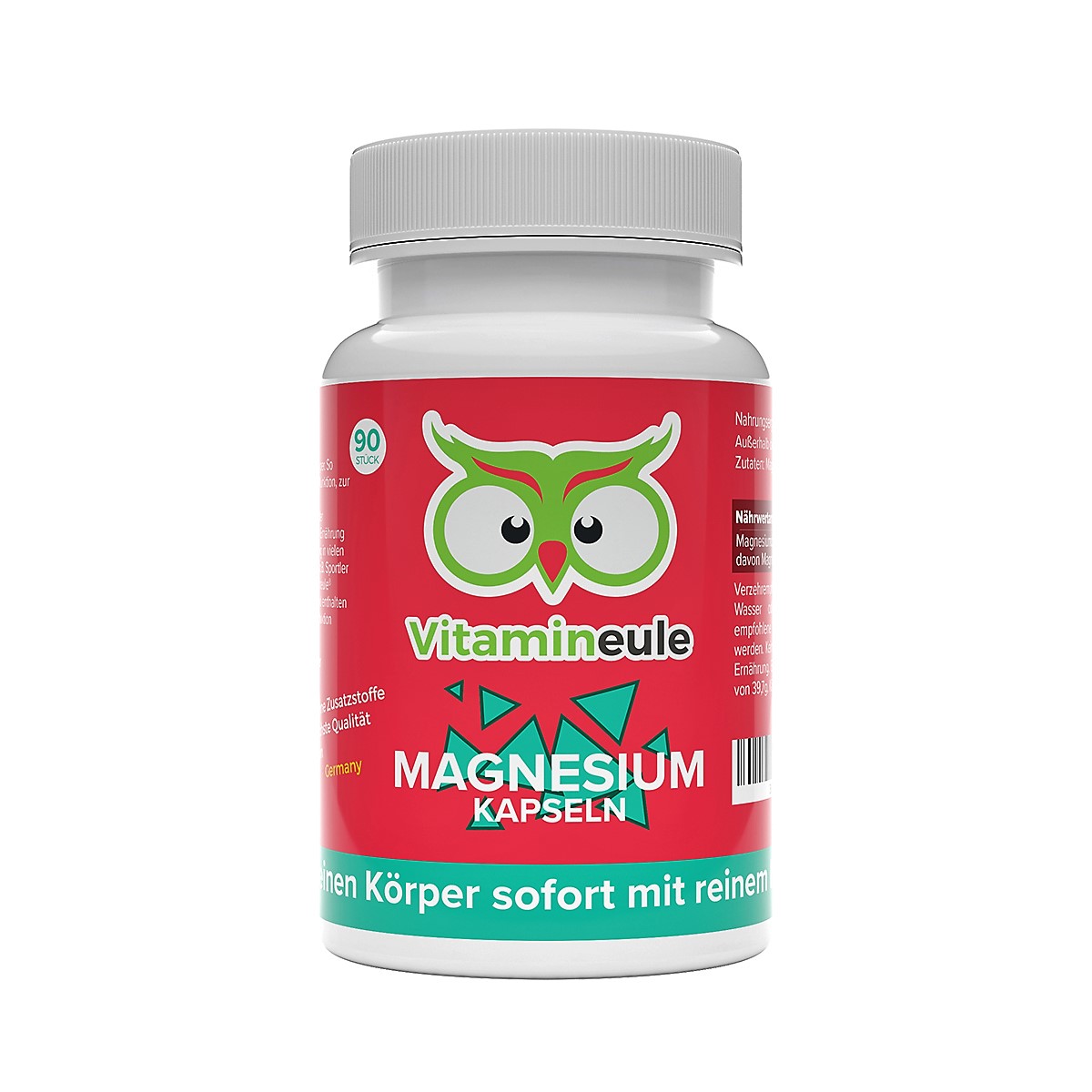

Team Vitamineule
Questions, wishes or suggestions? Simply contact us by e-mail or on Facebook.
One. What is magnesium?
Magnesium is an essential trace element. It is essential for human life, but the body cannot produce magnesium itself. For this reason, magnesium should be taken in daily through a healthy and balanced diet.
According to the recommendations of the German Nutrition Society (DGE), adults should consume about 300-400 mg of magnesium per day. The European Food Safety Authority EFSA, which sets the NRV, recommends, strictly speaking, 350 mg of magnesium per day for men and about 300 mg for women. Children should consume between 170-300 mg of magnesium depending on their age and size.
2 What is magnesium good for?
Magnesium is involved in energy metabolism and supports
muscle and nerve function. It also helps to maintain bones and teeth. Magnesium is good for a healthy electrolyte balance. The trace element ensures that fatigue is reduced and the nervous system functions correctly. Magnesium has a particularly good effect on the human brain. For the brain to function properly, the biochemical reactions require many catalysts. Magnesium participates in these transport processes and thus supports brain function. Magnesium plays an important role in cell division, as the trace element is an important activator of enzymes. One of the most important and probably the best known function of magnesium is the maintenance of the muscles in the human organism. Magnesium is good for maintaining normal muscle tone. Muscle tone is the state of tension between muscles. For this reason, a sufficient supply of magnesium is essential for humans to have a healthy balance between tension and relaxation of a muscle.
3. foods that contain a lot of magnesium
There are numerous natural sources which contain a lot of magnesium. These can be easily incorporated into the daily food intake. In contrast to other minerals, the magnesium requirement can be met not only by animal food, but also easily by plant food.
In general, the more natural the food is, the higher the mineral content in the end. This means that the more the food is processed, the lower the magnesium content. After the absorption of magnesium through drinks and food, the largest part is stored in our bones. The human organism can fall back on this storage in a situation of deficiency.
Here you will find some foods with which you can cover your daily magnesium requirements:
Magnesium content in mg/100 g
Nuts: approx. 130
Seeds/seeds: approx. 300-400
Dark chocolate: approx. 220
Natural rice: approx 150
Leaf spinach: approx. 58
Oat flakes: approx. 140
Wholemeal roll: approx. 95
fillet of beef: approx. 300
4. magnesium as a food supplement
Magnesium should normally be absorbed by the body on a daily basis. The best way to do this is naturally through a healthy and balanced diet. However, many people find it very difficult to cover their complete requirement of trace elements. Then magnesium should be taken in addition in order to avoid a magnesium deficiency.
Magnesium is available in the form of dietary supplements in stores. It is offered in the form of magnesium capsules and magnesium tablets. Both forms are easy to handle and quickly enter the circulation. However, magnesium tablets are often sold in pharmacies, which in many cases have been produced with artificial additives or abroad. Magnesium capsules often contain only the active ingredient in a vegetable cellulose shell and can therefore be produced without fillers.
Magnesium capsules or magnesium tablets should be taken with sufficient liquid (for example water or juice). It does not matter whether magnesium is taken before or after a meal. However, if you have a sensitive stomach and cannot take magnesium tablets or magnesium capsules on an empty stomach, you should eat something first and then take the food supplements. In general, you should always make sure that the product was produced in Germany in order to guarantee a consistently high quality of the preparation. If you buy a preparation from Germany, you can be sure that the product was also produced safely and is of high quality.
Our recommendation:
Vitamineule® Magnesium Capsules
In our online shop you will find our magnesium capsules from Vitamineule®, which are completely free of artificial additives. Vitamineule® Magnesium capsules contain 100 mg pure magnesium per capsule. Each can contains 90 capsules. Besides fast & free shipping, we offer a voluntary six-month return guarantee for all products.
5. conclusion: What is magnesium good for?
As one of the most important trace elements, magnesium is essential for the human organism. Magnesium is good for reducing fatigue and maintaining a healthy electrolyte balance. Magnesium is important for protein synthesis and for maintaining normal muscle function. If you do not know the range of your own magnesium value, you can determine your magnesium value fairly accurately by taking a blood sample from your family doctor. The blood taken is then analysed in the laboratory. If you suspect a magnesium deficiency, you should describe the exact symptoms to your doctor to make sure that they are actually due to a low magnesium value. If you have a magnesium deficiency, magnesium can be taken in the form of dietary supplements. These are available in the form of magnesium capsules and magnesium tablets.
Further sources:
- Magnesium in Disease Prevention and Overall Health
- The Importance of Magnesium in the Human Body: A Systematic Literature Review
- Magnesium and the Athlete
- Magnesium in Breast Cancer: What Is Its Influence on the Progression of This Disease?
- The Effects of Magnesium Supplementation on Subjective Anxiety
- Therapeutic Uses of Magnesium
- The role of magnesium in hypertension and cardiovascular disease

